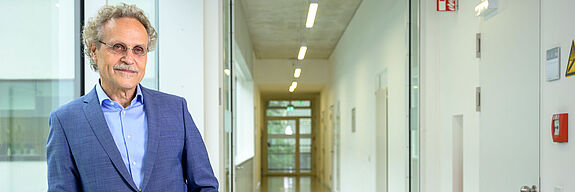Areas of investigation/research focus
Mouse models allow basic insights into the development and the progression of neurodegenerative diseases and therefore provide the opportunity to screen for effects of disease triggering genetic factors and of innovative therapeutic approaches in the entire organism. They are required for the solid and rapid preclinical translation of novel knowledge of basic research and the development of therapeutic concepts. Thus, these models are vital for molecular, physiological and behavioral dissection of neurodegenerative diseases. Hence the “Genome Engineering” Unit has the task to generate new, state-of-the-art mouse models for dementia, frontotemporal lobar degeneration (FTLD) and amyotrophic lateral sclerosis (ALS), respectively to investigate the impact of genetic defects on phenotypes and to evaluate innovative therapeutic approaches.
The transgenic unit of the German Center for Neurodegenerative Diseases (DZNE) is located at the Center of Stroke and Dementia Research (CSD) in Großhadern/Munich and is organized by Dr. Benedikt Wefers. The provisional group leader is Prof. Dr. Wolfgang Wurst.
The “Genome Engineering” Unit provides a centralized facility to generate mouse models of neurodegenerative diseases in particular of frontotemporal lobar degeneration (FTLD), amyotrophic lateral sclerosis (ALS) and dementia. To generate transgenic mouse models (e.g. point mutations, null mutations, conditional inducible knock-in and knock-out mutants, and deletion mutants), standard methods like the manipulation of mouse embryonic stem cells, the establishment of germ line chimera and the latest genome editing technologies, which includes the application of TALENs and the CRISPR/Cas9 system, directly in mouse one-cell embryos, are used.
The portfolio of the unit encompasses consulting and support in the design of targeting strategies, targeting vector design, the use of ES cells or one-cell embryos, validation of established models, interpretation of results, provision of standard procedures (SOPs), and providing direct access to the EUCOMM/IKMC mouse mutant resources (Prof. Dr. W. Wurst, coordinator). Furthermore, new methods are constantly developed to easily and specifically induce somatic mutations, to improve targeting efficiency, to reduce additional, unintended mutations, and to reduce the number of animals used.
Besides the generation of new transgenic mouse lines, the Unit also provides counseling in mutant analysis in particular of molecular, histological and behavioral studies.

